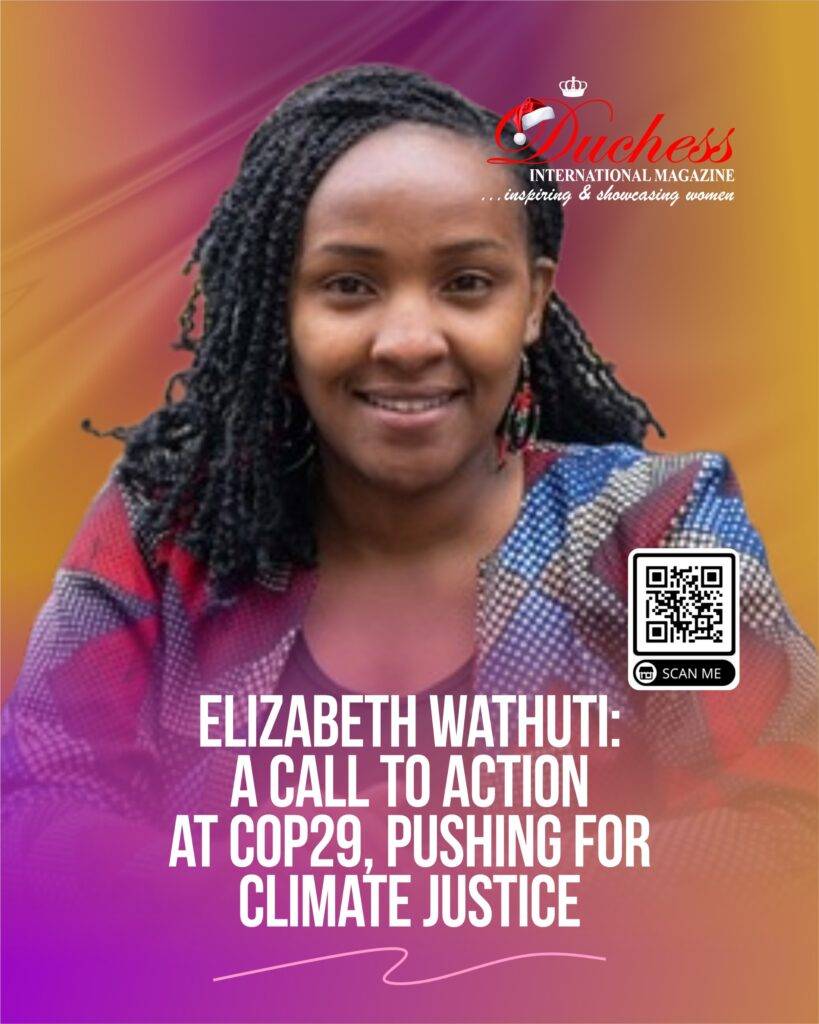As the world gathered for COP29 to negotiate pledges and outline climate solutions, one voice stood out among the buzz of international diplomacy — that of Elizabeth Wathuti. A 28-year-old Kenyan climate activist, Wathuti has become a powerful symbol of the urgency that young people are bringing to the global conversation on climate change. While global leaders convened to make promises, Wathuti has been quietly delivering results — one tree, one child, one resilient community at a time.
In the midst of COP29’s whirlwind of meetings, speeches, and pledges, Wathuti’s unwavering commitment to climate action remains at the forefront of her mission. Dressed in a striking red jacket that seemed to mirror the gravity of her message, she spoke not only as an advocate but as a catalyst for change, reminding world leaders that action can no longer be delayed.
Born and raised in Kenya’s forested region, Wathuti witnessed firsthand the devastating effects of deforestation. This early exposure fueled her drive to address environmental issues head-on. In 2018, she founded the Green Generation Initiative, which focuses on nurturing young people’s connection to nature while tackling climate challenges at the grassroots level. Her efforts have already transformed lives across Kenya, particularly in schools where her initiative plants trees, promotes regenerative agriculture, and provides fruit trees to supplement school feeding programs.
“We believe in building resilience at the local level,” Wathuti explains. Her organization’s work goes beyond environmental conservation; it focuses on ensuring that vulnerable communities are empowered to thrive in the face of climate adversity. By greening school compounds and teaching young people to appreciate the environment, Wathuti is not just planting trees — she’s planting the seeds for a more sustainable and resilient future.
Wathuti’s work has earned her widespread recognition. She was awarded the 2019 Africa Green Person of the Year Award and has been named one of the 100 Most Influential Young Africans by the Africa Youth Awards. These accolades are a testament to her tireless work and the growing momentum of youth-led climate activism across Africa. Her advocacy is grounded in her deep belief that local solutions can tackle global challenges.
At COP29, Wathuti made it clear that the world must catch up to the solutions already being implemented on the ground. “The youth are already driving climate action,” she asserted. “The solutions are here, and they are real.” Her passionate call to action emphasized the need for global leaders to move beyond rhetoric and invest in the initiatives that are working at the community level.
But Wathuti’s advocacy doesn’t stop at environmental conservation. She has consistently raised the issue of climate finance, highlighting the financial mechanisms that often fail to reach the most vulnerable communities. For Wathuti, addressing climate finance isn’t just a matter of ensuring funds are distributed; it’s about ensuring that these funds are allocated in a way that empowers communities to take meaningful action.
Her message also shines a spotlight on the crucial role of women in climate resilience. “Women are often the most affected by climate change,” she explains. “But they are also the ones leading the charge in finding solutions.” In many communities, it is women who are organizing, planting trees, and finding innovative ways to adapt to changing environmental conditions. Yet, Wathuti argues, women’s voices are often excluded from decision-making tables.
“If we are not having women at the decision-making tables, we’re missing out on solutions that are already working,” Wathuti emphasized. She believes that amplifying women’s voices in climate discussions is not just a matter of fairness — it’s a matter of effectiveness. Women’s leadership, she argues, is essential for achieving the transformative change that is needed to address the climate crisis.
Despite the challenges, Wathuti remains hopeful and energized. For her, hope is not just a feeling; it is the driving force behind her work. “We cannot just sit back and be frustrated by the impacts of climate change,” she says. “We must find solutions, and we must act.” It’s a mindset that she believes is critical for the survival of future generations.
Her passion is rooted in her personal experiences. Growing up, Wathuti saw the stark contrast between lush forests and barren lands scarred by deforestation. That contrast continues to fuel her determination to green the planet and create resilient communities. “Every tree planted, every green space created — it all makes a difference,” she reflects. This belief drives her work and keeps her going, even as the challenges of climate change become more pressing.

As one of the youngest leaders at COP29, Wathuti understands that her generation has a pivotal role to play in shaping the future. “Africa has the largest population of young people in the world, and over 70% are under 30,” she points out. “This is not just about the future; this is about the now.” Her call for youth-centered policies and meaningful representation at the global level is a crucial reminder that young people are not just inheriting the climate crisis — they are leading the fight to solve it.



